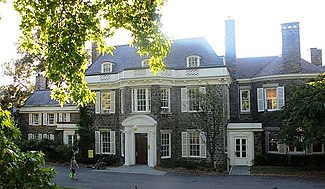Wave Hill (New York)
|
Wave Hill
|
|

Wave Hill House
|
|
| Location | 675 W. 252nd St., Bronx, New York |
|---|---|
| Coordinates | 40°53′55″N 73°54′47″W / 40.89861°N 73.91306°WCoordinates: 40°53′55″N 73°54′47″W / 40.89861°N 73.91306°W |
| Area | 20.9 acres (8.5 ha) |
| Built | 1843 |
| Architect | Multiple |
| Architectural style | Colonial Revival, Greek Revival |
| NRHP reference # | 83001646 |
| Significant dates | |
| Added to NRHP | September 9, 1983 |
| Designated NYCL | June 21, 1966 |
Wave Hill is a 28-acre (11 ha) estate in the Hudson Hill section of Riverdale, Bronx, in New York City. Wave Hill currently consists of public horticultural gardens and a cultural center, all situated on the slopes overlooking the Hudson River, with expansive views across the river to the New Jersey Palisades. Listed on the National Register of Historic Places, the estate includes two houses and a botanical garden. The oldest part of the main house, Wave Hill House, dates back to 1843; Glyndor House dates from 1927 and contains a multi-room art gallery. Perkins Visitor Center, which was originally a garage, contains a gift shop and an information desk.
During the late 19th century and early 20th century, numerous highly notable people resided in Wave Hill, either because they owned it, leased it, or stayed there as guests. In 1960, the estate was given to the City of New York, and Wave Hill is now a cultural center as well as a garden. In addition to the free, constantly changing, contemporary visual arts exhibits that are on display in the Glyndor Gallery within Glyndor House, paid-ticket concert series take place on some Sunday afternoons in Armor Hall, featuring music that includes such styles as chamber music and jazz.
The original Wave Hill House was a gray fieldstone mansion built in 1843 by lawyer William Lewis Morris. It was owned from 1866 to 1903 by publisher William Henry Appleton, who enlarged the house in between 1866 and 1869 and again in 1890, and added greenhouses and gardens to the grounds. During these years, the house was visited by Thomas Henry Huxley, who helped Charles Darwin bring evolution by natural selection to the public's attention. Theodore Roosevelt's family rented Wave Hill during the summers of 1870 and 1871, and Mark Twain leased it from 1901 to 1903.
...
Wikipedia



